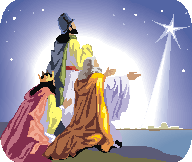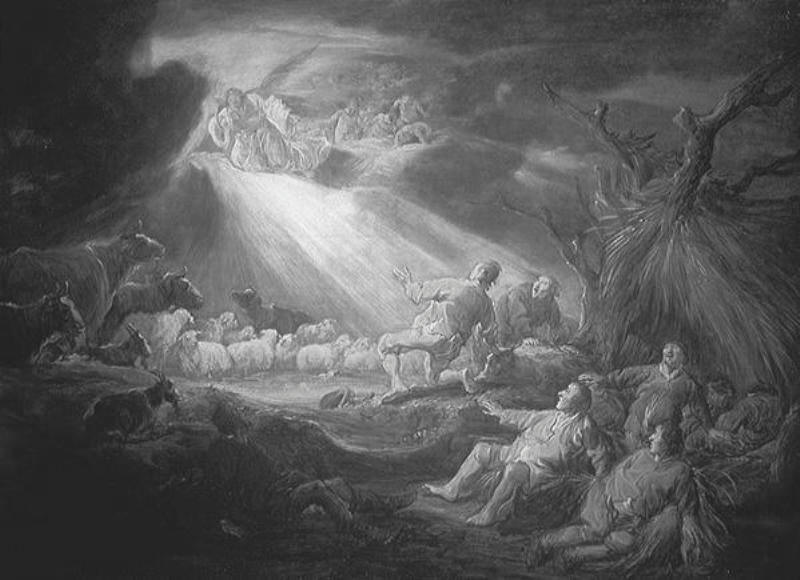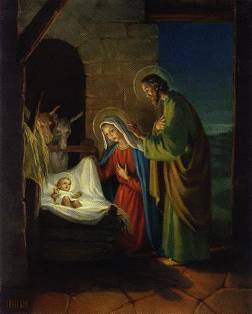In ancient times,
Europeans rejoiced during the winter solstice because the worst of the
 cold
season was gone and they could look forward to warmer weather and longer hours
of sunlight. The Romans celebrated their winter solstice with the Festival of
Saturnalia in December while the Germanic tribes of Europe also held a feast to
honor mid-winter. Scandinavians celebrated Yule from December 21 through
January as they awaited return of the sun and a time of new prosperity.
cold
season was gone and they could look forward to warmer weather and longer hours
of sunlight. The Romans celebrated their winter solstice with the Festival of
Saturnalia in December while the Germanic tribes of Europe also held a feast to
honor mid-winter. Scandinavians celebrated Yule from December 21 through
January as they awaited return of the sun and a time of new prosperity.
The Christian Emperor Constantine decided the birth of Christ was cause for celebration and that December 25 was a good time for the celebration. It would give Christians a solid reason to celebrate their holiday with the other citizens. Christmas in 340 AD was established as a holiday for all; and celebrations for two religions in Rome took place on that day: Sun regeneration and the Christian nativity (Sun of Righteousness). The Nativity gradually became the only symbol and purpose for celebrating December 25. In the same century, Nicholas, a bishop in Turkey, came to be known as St. Nicholas because of his kind deeds to the needy.
During the religious reform of the 1600's, Christmas celebrations changed in Europe. In 1645, Oliver Cromwell and his Puritan forces banned the 'pagan' holiday of Christmas as witchcraft. Charles II restored the holiday when he came into power.
For it dawns, the promised morrow
Of His birth, Who the earth rescues from her sorrow.
God to wear our form descendeth;
Of His grace to our race here His Son He sendeth.
J. G. Ebeling
Booker Taliaferro Washington:
In the school we made a special
effort to teach our students the meaning of Christmas, and to give them lessons
in its proper observance. In this we have been successful to a degree that makes
me feel safe in saying that the season now has a new meaning, not only through
all that immediate region, but, in a measure, wherever our graduates have gone.
At the present time one of the most satisfactory features of the Christmas
and Thanksgiving season at Tuskegee is the unselfish and beautiful way in which
our graduates and students spend their time in administering to the comfort and
happiness of others, especially the unfortunate. Not long ago some of our young
men spent a holiday in rebuilding a cabin for a helpless coloured woman who was
about seventy-five years old. At another time I remember that I made it known in
chapel, one night, that a very poor student was suffering from cold, because he
needed a coat. The next morning two coats were sent to my office for him.
 According to Captain John Smith, Americans in Jamestown enjoyed Christmas in the
1600's even though the pilgrims in Boston outlawed Christmas from 1620 to 1681.
Connecticut also had a law forbidding the celebration of Christmas. After
the American Revolution, Christmas was not, as a rule, looked upon favorably by
Americans as it was considered an English custom; and, therefore, not a federal
holiday. In fact, the first Christmas in 1789 under America's new
Constitution found the representatives of Congress at work.
According to Captain John Smith, Americans in Jamestown enjoyed Christmas in the
1600's even though the pilgrims in Boston outlawed Christmas from 1620 to 1681.
Connecticut also had a law forbidding the celebration of Christmas. After
the American Revolution, Christmas was not, as a rule, looked upon favorably by
Americans as it was considered an English custom; and, therefore, not a federal
holiday. In fact, the first Christmas in 1789 under America's new
Constitution found the representatives of Congress at work.
In the 1800s, authors, artists, and
songwriters began adding their versions of Christmas through their creative
energies. Santa was transformed by the poem of Clement C. Moore and the
pictures drawn by Thomas Nast.
In 1819, author Washington Irving wrote stories about Christmas in an old
English house. They were about a squire who invited peasants into his home for
the holiday. Unlike America where the rich and poor clashed, the rich and poor
in England were able to mingle politely and with sincere joy. Irving imagined
that a holiday celebrating the birth of Christ should be peaceful and
love-filled for all, regardless of social status.
Also around this time, Charles Dickens
wrote "A Christmas Carol," a story which touched the hearts of people to make
them realize the value of family and of charity and good will to all of
humankind. Christmas provided the reminder for devotion and reflection; and it
gave families a time to lavish fun and attention to children.
The first three states to make Christmas a legal holiday were in the South: Alabama in 1836, Louisiana and Arkansas in 1838. In 1856 Christmas was made a legal holiday in Massachusetts. It wasn't declared a federal holiday until June 26, 1870. In the years after the Civil War, Christmas became a happy tradition throughout the country. Children's books and women's magazines played an important role in giving ideas for decorating and baking for Christmas. Sunday school classes taught about the birth of Jesus.
As people looked to recent immigrants and to Catholic and Episcopalian churches for old customs on how the day should be celebrated, Americans lovingly pieced together a Christmas tradition all their own. Over the next century, customs from many religions and even paganism from some areas of the world were absorbed and Christianized to became part of the American Christmas heritage. http://hoover.archives.gov/index.html
![]()
![]()

Dr. Maulana “Ron” Karenga, a former black militant and convicted felon, is a marxist who had decided that African-Americans shouldn't celebrate Christmas, a “white man's holiday.” He invented Kwanzaa as a black anti-Christian observance to help un-whiten the Christmas season. With some African-sounding words and a few principles that sound good, he manufactured a holiday, a holiday which has no connection to anything genuinely African.
While the principles sound commendable, the true principle behind Kwanzaa is based on race. "People think it's African, but it's not," he said about his holiday in an interview quoted in the Washington Post. "I came up with Kwanzaa because black people in this country wouldn't celebrate it if they knew it was American. Also, I put it around Christmas because I knew that's when a lot of bloods would be partying." attributed to Washington Post, 1978 ("Bloods" was California slang for black people.)
Just five years after his invention, he was convicted of torturing two black women by stripping them naked, beating them with a baton and electrical cords, placing a hot iron into the mouth of one, and mangling the toe of the other in a vice. He also forced them to drink detergent and had running hoses put in their mouths.
But all of that was forgotten by 1975 as he was proclaimed Saint Karenga and got himself installed as the chairman of the Department of Black Studies at California State University, Long Beach.
Just about the time Maulana Karenga (formerly Ron N. Everett) was making up a new holiday in the 1960's, he was also inventing a new political movement (black cultural nationalism) on the campus of UCLA. His group was called United Slaves (Us/US). Its competition with the Black Panthers at UCLA resulted in two of his followers shooting dead two members of the Panthers in 1969.
"Anywhere we are, Us is" is the motto of the United Slaves. It maintains the Official Kwanzaa Web site which claims that Africa's first harvest celebrations were recorded in ancient Egypt and Nubia. There is no identification of the crops they harvested or why they would hold a harvest festival in the winter. Kwanzaa's celebration uses two ears of maize but maize is a New World plant, and it wasn't known at all in ancient Africa.
For Kwanzaa, ears of maize are called "muhindi," which is Swahili. All the objects of Kwanzaa have names taken from Swahili because, claims the website, it is "a Pan-African language" and "the most widely spoken African language" (Official Kwanzaa Website). But Swahili is a Bantu tongue with many words from Arabic, Persian, and some Indian languages. It is spoken by relatively few Africans--about 7% of the population--mostly in eastern Africa--Uganda, Kenya, Tanzania and a strip of Zaire. The language which is used most widely in Africa is not Swahili, but Arabic. It is also curious that since most ancestors of black Americans were from West Africa that Swahili, spoken by countries much further away, would be the chosen language.
The
seven harmless-sounding principles of Kwanzaa are mumbo jumbo socialism and
encouragement for worshipping false gods. They are designed to make Kwanzaa
look like something out of Africa instead of something from Los Angeles County:
notumoja (unity), kujichagulia (self-determination), ujima (collective work and
responsibility), ujamaa (cooperative economics), nia (purpose), kuumba
(creativity), and imani (faith). They serve to spiritually separate blacks from
America with a false sense of culture and identity.
Ears of maize and other Kwanzaa equipment can be purchased from the University
of Sankore Press, a company in Los Angeles. Research shows that the University
of Sankore was an aggregation of Islamic schools at Timbuktu in the 14th, 15th,
and 16th centuries. No University of Sankore exists today.
Paul
Mulshine,
FrontPagemag.com
http://www.worldnetdaily.com/news/article.asp?ARTICLE_ID=25998
WorldNetDaily.com
http://www.lmp.ucla.edu/profiles/profs04.htm
William J. Bennetta is a professional editor, a fellow of the California Academy
of Sciences, the president of The Textbook League, and the editor of The
Textbook Letter.

Christians worship Christ as intercessor between us and God while Karenga claims Christianity is a myth.
Reverend Jesse Lee Peterson has called Kwanzaa a racist, pagan, Marxist holiday and has said that Kwanzaa founder Maulana (Ron) Karenga "want[s] to get rid of God." Peterson also explains that the United States has no need for Kwanzaa because as a nation we already believe in Christ. Hannity&Colmes
Peterson's comments ring true because Karenga and his followers like most pagans seem to worship by ceremony something in creation; i.e., their African ancestors as spiritual intercessors between humans and God. They do not believe in the God of the Bible. Kwanzaa is a holiday timed to be celebrated with Christmas and manufactured so that blacks can celebrate themselves, not the birth of Christ.
Taking Kwanzaa seriously is all part of the spirit of multiculturalism.
Christ became a man to save
men, not to lift up one race or culture in worship.
Over the years, Karenga
has altered his original claims to attract more black Christians by saying that
Kwanzaa is a time of giving “reverence to
the Creator.” Since he is not reverent to, and is actually hostile
toward God, it is unclear as to just what creator he refers to.

Jesus Christ is the same yesterday, today, and
forever. Do not be carried about with various and strange doctrines.
Hebrews 13:8-9
 O
Holy Night
O
Holy Night 


 O holy
night! The stars are brightly shining,
O holy
night! The stars are brightly shining,
It is the night of the dear Saviour's birth.
Long lay the world in sin and error pining
Till He appeared and the Spirit felt its worth.
A thrill of hope the weary world rejoices,
For yonder breaks a new and glorious morn.

Fall on your knees! Oh, hear the angel voices!
O night divine, the night when Christ was born;
O night, O holy night, O night divine!
O night, O holy night, O night divine!
Led by the light of faith serenely beaming,
With glowing hearts by His cradle we stand.

O'er the world a star is sweetly gleaming,

Now come the wise men from out of the Orient land.
The King of kings lay thus in lowly manger;
In all our trials born to be our friend.
He knows our need, our weakness is no stranger,
Behold your King! Before him lowly bend!
Behold your King! Before him lowly bend!
Truly He taught us to love one another,
His law is love and His gospel is peace.

Chains shall He break, for the slave is our brother.
And in His name all oppression shall cease.
 Sweet hymns of joy in grateful chorus raise we,
Sweet hymns of joy in grateful chorus raise we,
With all our hearts we praise His holy name.
Christ is the Lord! Then ever, ever praise we,
His power and glory ever more proclaim!
His power and glory ever more proclaim!

Prayer Within a Festive
Christmas
Wakened shadows of bright lights glow from within my heart,
To feel the beating ember of cheer, hopeful and stalwart.
There amidst the clamor of Christmas bells, I know
Glory and honor due to You this season will flow
Even up into the heavens.
A silent prayer within me swells,
Alight with thanksgiving that dwells
For always within for the Son whose name we praise
And celebrate with peace and love on holy days
Throughout all the earth.
O Blessed Redeemer, never does Your beauty wane.
Robed in splendor, You are king TO forever reign.
We triumph in Your coronation,
Rejoice in our eternal salvation
From within the depths of our souls.
@Kara L. Kraemer,
2008
From angels
bending near the earth,
To touch their harps of gold:
(From "It Came Upon the Midnight Clear")
Below from
"A Christmas-Day Sermon" by
Samuel Davies December 25, 1758
From Rev. Samuel Davies, “A Christmas-Day Sermon” Sermons (Philadelphia:
Presbyterian Board of Publication, 1864) 3.562-586. (minor spelling
changes)
And suddenly there was with the angel a multitude of the heavenly host, praising God, and saying, Glory to God in the highest, and on earth, peace, goodwill towards men.
LUKE 2:13-14
What a happy night was this to the poor
shepherds, though exposed to the damps and darkness of midnight, and keeping
their painful watches in the open field. An illustrious angel, clothed in light
which kindled midnight into noon, came upon them, or suddenly hovered over them
in the air, and the glory of the Lord, that is, a bright refulgent light, the
usual emblem of his presence shone round about them. No wonder the poor
shepherds were struck with horror, and overwhelmed at the sight of so glorious a
phenomenon........
......And the first and chief cause of joy and praise from the birth of a Savior
is, that he shall bring glory to God. Through him, as a proper medium, the
divine perfections shall shine forth with new, augmented splendor. Through him,
sinners shall be saved in a way that will advance the honor of the divine
perfections and government: or if any of them perish, their punishment will more
illustriously display the glory of their offended Sovereign. The wisdom, grace,
and mercy of God, are glorified in the contrivance of this scheme of redemption,
and making millions of miserable creatures happy forever. His power is
glorified, in carrying this scheme into execution, in spite of all opposition.
His Justice is glorified, in the atonement and satisfaction made for the sins of
men by an incarnate Deity, and in the righteous and aggravated punishment
executed upon those that obstinately reject this divine Savior, and who
therefore perish without the least umbrage of excuse. Oh! what wonders does
Jehovah perform, in prosecution of this method of salvation! What wonders of
pardoning mercy and sanctifying grace! What miracles of glory and blessedness
does he form out of the dust, and the polluted fragments of human nature! What
monuments of his own glorious perfections does he erect, through all the
extensive regions of heaven! From these wonderful works of his, the glory of his
own name breaks forth upon the worlds of angels and men, in one bright unclouded
day, which shall never be obscured in night, but grow more and more illustrious
through the endless ages of eternity! ....

Benjamin Gerritsz Cuyp (1612-1652 Dutch painter), Annunciation to the Shepherds, oil on panel 33 x 45 3/8 in. State Hermitage Museum, St. Petersburg http://www.joyfulheart.com/christmas/artwork_angels.htm http://www.joyfulheart.com/christmas/artwork_angels.htm
All articles are protected by international copyright laws. All rights are reserved. A single copy of this article is free. Copyright permission to make up to 1,000 copies of an article for free distribution is granted to Christian churches at no charge.
Please include the following copyright statement at the bottom:
"Copyright Ralph F. Wilson <pastor![]() joyfulheart.com>.
All rights reserved. Used by permission."
joyfulheart.com>.
All rights reserved. Used by permission."
![]() Far away, shepherds of the field were visited by angels that proclaimed glad
tidings of joy. The promised Messiah was entered into the world as a newborn
babe, wrapped in swaddling clothes, and lying upon straw in a manger. Jesus,
our Emmanuel, was here!
Far away, shepherds of the field were visited by angels that proclaimed glad
tidings of joy. The promised Messiah was entered into the world as a newborn
babe, wrapped in swaddling clothes, and lying upon straw in a manger. Jesus,
our Emmanuel, was here!
Hark the herald
angels sing
Wesley
Glory to the newborn King
Peace on earth and mercy mild
God and sinners reconciled
Joyful, all ye nations, rise
Join the triumph of the skies
With angelic host proclaim
Christ is born in Bethlehem
Hark! the herald angels sing
Glory to the newborn King
Christ, by highest
heaven adored
Christ, the everlasting Lord
Late in time behold him come
Offspring of the Virgin's womb
Veiled in flesh the Godhead see
Hail the incarnate Deity
Pleased as man with man to dwell
Jesus, our Emmanuel
Mild he lays his glory by
Born that man no more may die
Born to raise the sons of earth
Born to give them second birth
Risen with healing in his wings
Light and life to all he brings
Hail, the Son of Righteousness
Hail, the Heaven born Prince of Peace
Hail the Heaven born Prince of Peace
Hail the Son of Righteousness
Light and
life to all He brings
Risen with healing in His wings
Mild He lay His glory by
Born that man no more may die
Come Desire of nations come
Fix in us thy humble home
Rise, the woman's conquering seed
Bruise in us the serpent's head
Adam's likeness now efface
Stamp thine image in its place
![]() "For
there is born to you this day in the city of David a Saviour, who is Christ the
Lord."
"For
there is born to you this day in the city of David a Saviour, who is Christ the
Lord."
Luke 2:1-18
1
And it came to pass in those days, that there went out a decree from Caesar
Augustus that all the world should be taxed.
2 (And this taxing was first made when Cyrenius was governor of Syria.)
3 And all went to be taxed, every one into his own city.
4 And Joseph also went up from Galilee, out of the city of Nazareth,
into Judaea, unto the city of David, which is called Bethlehem; (because he was
of the house and lineage of David:) 5 To be taxed with Mary his espoused
wife, being great with child.
6 And so it was, that, while they were there, the days were accomplished
that she should be delivered.
7 And she brought forth her firstborn son, and wrapped him in swaddling
clothes, and laid him in a manger; because there was no room for them in the
inn.
8 And there were in the same country shepherds abiding in the field,
keeping watch over their flock by night.
9 And, lo, the angel of the Lord came upon them, and the glory of the
Lord shone round about them: and they were sore afraid.
10 And the angel said unto them, Fear not: for, behold, I bring you good
tidings of great joy, which shall be to all people.
11 For unto you is born this day in the city of David a Saviour, which is
Christ the Lord.
12 And this shall be a sign unto you; Ye shall find the babe wrapped in
swaddling clothes, lying in a manger.
13 And suddenly there was with the angel a multitude of the heavenly host
praising God, and saying, 14 Glory to God in the highest, and on earth
peace, good will toward men.
15 And it came to pass, as the angels were gone away from them into
heaven, the shepherds said one to another, Let us now go even unto Bethlehem,
and see this thing which is come to pass, which the Lord hath made known unto
us.
16 And they came with haste, and found Mary, and Joseph, and the babe
lying in a manger.
17 And when they had seen it, they made known abroad the saying which was
told them concerning this child.
18 And all they that heard it wondered at those things which were told
them by the shepherds.
From A Christmas sermon by Martin Luther, from his Wartburg Church Postil, 1521-1522
The Evangelist shows how, when they arrived at
Bethlehem, they were the most insignificant and despised, so that they had to
make way for others until they were obliged to take refuge in a stable, to share
with the cattle, lodging, table, bedchamber and bed, while many a wicked man sat
at the head in the hotels and was honored as lord. No one noticed or was
conscious of what God was doing in that stable. He lets the large houses and
costly apartments remain empty, lets their inhabitants eat, d rink
and be merry; but this comfort and treasure are hidden from them. 0 what a dark
night this was for Bethlehem, that was not conscious of that glorious light! See
how God shows that he utterly disregards what the world is, has or desires; and
furthermore, that the world shows how little it knows or notices what God is,
has, and does.
rink
and be merry; but this comfort and treasure are hidden from them. 0 what a dark
night this was for Bethlehem, that was not conscious of that glorious light! See
how God shows that he utterly disregards what the world is, has or desires; and
furthermore, that the world shows how little it knows or notices what God is,
has, and does.
[Words above taken from a sermon, volume I:134-160 of The Sermons of Martin Luther, published by Baker Book House (Grand Rapids, MI). It was originally published in 1906 in English by Lutherans in All Lands Press (Minneapolis, MN), as The Precious and Sacred Writings of Martin Luther. This e-text was scanned and edited by Richard Bucher, it is in the public domain and it may be copied and distributed without restriction.] http://www.orlutheran.com/html/mlselk2.html
From Heaven Above to Earth I Come Martin Luther, 1535
From Heave Above to Earth I Come
To bear good news to every home;
Glad tidings of great joy I bring, Whereof I now will say and sing.
To you, this night, is born a Child Of Mary, chosen mother mild;
This tender Child of lowly birth, Shall be the joy of all your earth.
http://www.biblia.com/christmas/manger.htm
’Tis Christ our God, who far on
high Had heard your sad and bitter cry;
Himself will your Salvation be, Himself from sin will make you free.
He brings those blessings long
ago Prepared by God for all below;
That in His heavenly kingdom blest You may with us forever rest.
These are the tokens ye shall
mark, The swaddling clothes and manger dark;
There shall ye find the young Child laid, By Whom the heavens and
earth were made.
Now let us all, with gladsome
cheer, Follow the shepherds, and draw near
To see this wondrous Gift of God, Who hath His own dear Son bestowed.
Give heed, my heart, lift up thine
eyes! What is it in yon manger lies?
Who is this Child, so young and fair? The blessčd Christ Child lieth there!
Welcome to earth, Thou noble
Guest, Through Whom ev’n wicked men are blest!
Thou com’st to share our misery, What can we render, Lord, to Thee!
Ah, Lord, who hast created all,
How hast Thou made Thee weak and small,
To lie upon the coarse dry grass, The food of humble ox and ass.
Were earth a thousand times as
fair, Beset with gold and jewels rare,
She yet were far too poor to be A narrow cradle, Lord, for Thee.
For velvets soft and silken stuff
Thou hast but hay and straw so rough,
Whereon Thou King, so rich and great, As ’twere Thy heaven, art throned in
state.
Thus hath it pleased Thee to make
plain The truth to us, poor fools and vain,
That this world’s honor, wealth and might Are naught and worthless in Thy
sight.
Ah, dearest Jesus, holy Child,
Make Thee a bed, soft, undefiled,
Here in my poor heart’s inmost shrine, That I may evermore be Thine.
My heart for very joy doth leap, My lips no more
can silence keep,
I too must sing, with joyful tongue, That sweetest ancient cradle song.
Glory to God in highest Heaven, Who unto man His
Son hath given,
While angels sing, with pious mirth, A glad New Year to all the earth.
A GREAT AND MIGHTY WONDER
Words: St. Germanus
Translated to English by
John Mason Neale, 1862.
A great and mighty
wonder
A full and holy cure!
The Virgin bears the I nfant
nfant
With virgin-honour pure.
The Word becomes
Incarnate,
And yet remains on high:
And Cherubim sing anthems
To shepherds from the sky.
And we with them
triumphant
Repeat the hymn agen:,
“To God on high be glory,
And peace on earth to men.”
While thus they
sing your Monarchy
Those bright angelic bands,
Rejoice, ye vales and mountains,
Ye oceans, clap your hands.
Since all he
comes to ransom,
By all be he adored,
The Infant born in Beth’lem,
The Saviour and the Lord.
And idol forms
shall perish,
And error shall decay,
And Christ shall wield his sceptre;
Our Lord and God for aye.
Source: George Radcliffe Woodward, ed., Songs of Syon (London: Schott & Co., Third Edition, 1908), # 29
The Lord had mysteriously come as an infant to grow and live amongst mankind! With perfect everlasting light, He would guide lost hearts back to the Father. And He would one day "utter things which have been kept secret from the foundation of the world."
O
holy night! The stars are brightly shining,
It is the night of the dear Saviour's birth.
Long lay the world in sin and error pining
Till He appeared and the Spirit felt its worth.
A thrill of hope the weary world rejoices,
For yonder breaks a new and glorious morn.
Fall on your knees! Oh, hear the angel voices!
O night divine, the night when Christ was born;
O night, O holy night, O night divine!
O night, O holy night, O night divine!

Led by the light of faith serenely
beaming,
With glowing hearts by His cradle we stand.
O'er the world a star is sweetly gleaming,
Now come the wise men from out of the Orient land.
The King of kings lay thus in lowly manger;
In all our trials born to be our friend.
He knows our need, our weakness is no stranger,
Behold your King! Before him lowly bend!
Behold your King! Before him lowly bend!
Truly He taught us to love one another,
His law is love and His gospel is peace.
Chains shall He break, for the slave is our brother.
And in his name all oppression shall cease.
Sweet hymns of joy in grateful chorus raise we,
With all our hearts we praise His holy name.
Christ is the Lord! Then ever, ever praise we,
His power and glory ever more proclaim!
His power and glory ever more proclaim!
Placide Cappeau, 1847
The heavens rang with joy and the world knew hope in that night when King Jesus was born.